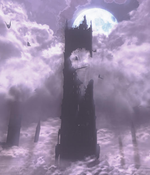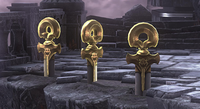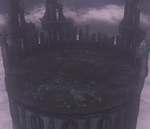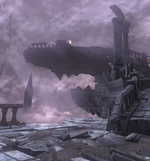Ruined Kingdom
Template:SMOlocation-infobox The Ruined Kingdom is the twelfth kingdom visited in Super Mario Odyssey. The greater location of Crumbleden, the Ruined Kingdom is a stormy and mysterious world filled with the ruins of a long-dead kingdom.
During the events of the game, Mario and Cappy crash land the Odyssey in this location after Bowser and the Ruined Dragon attack them. The crash leaves the Odyssey damaged, requiring three Power Moons to restore back to working condition. Mario fights and defeats the Ruined Dragon in this kingdom, enabling him to use the Odyssey again to leave and continue his journey to Bowser's Kingdom.
Brochure details
Reaching for the Heavens
This tower once collected energy from lightning in the thunderclouds that constantly swirl here. Some say it was destroyed by repeated lightning strikes, but others note the unnatural shapes into which the tower crumbled and wonder if it fell into ruin for different reasons entirely.
High Stakes
Amid the ruins, these swords surely stand out. They're thought to be left over from a large battle here in Crumbleden. One certainly feels a sense of intentionality in the way they're stuck straight down, as if fallen from the sky. Some see them not as swords, but rather nails or stakes. Perhaps the eyelets at the top allowed ropes or chains through to anchor something, but it's impossible to say what.
Ruined Dreams
It's only because of the people of Crumbleden's skill in construction that there are ruins left here to see. Their building style was reliable and straightforward, but whatever they'd hoped to accomplish by harnessing the fearsome power of lightning remains unclear. Some have theorized that the circular plaza atop the tower was built for a standoff of some kind.
The Great Altar
It's thought that this altar was built so this former kingdom could communicate with (or perhaps confront) something. This is the only altar built here, and scholars have been keen to discover its intent. It's also said to be shaped like something in particular. The idea that it was meant to charge lightning has been disproven. The new theory is that it was built to call something down and then restrain the lightning.
Are Those...Claw Marks?
The stone here has numerous large slashes cut through it, often in parallel tracks suggesting giant claws. But that can't be right—what could claw through stone?
Buried Treasures
You'll see glowing spots scattered around on the ground. Engage in some amateur archelogy by giving them a hearty stomp!
Three Keys to the Kingdom
- Visit the vast crumbling tower still standing watch over the area.
- Investigate the deep, clawlike marks in the stone.
- Admire the durable construction techniques of a once proud kingdom.
Enemies
Objectives
- Battle with the Lord of Lightning!: The goal is to defeat the Ruined Dragon to proceed to Bowser's Kingdom.
Power Moons
There are a total of 10 Power Moons in Crumbleden. Mario needs to collect 3 to repair the Odyssey, making it the second smallest location in the game, beaten by the Nimbus Arena.
- Main article: List of Power Moons in the Ruined Kingdom
Names in other languages
Ruined Kingdom
| Language | Name | Meaning | Notes |
|---|---|---|---|
| Japanese | 奪われし国[?] Ubawareshi Kuni |
Usurped Country | |
| Chinese | 被夺之国 (Simplified) 被奪之國 (Traditional)[?] Bèi duó zhī guó |
Seized Country | |
| Dutch | Ruïnerijk[?] | Ruin Realm | |
| Italian | Regno dei Ruderi[?] | Ruins Kingdom | |
| Spanish | Reino de las Ruinas[?] | Ruins Kingdom |
Crumbleden
| Language | Name | Meaning | Notes |
|---|---|---|---|
| Japanese | ホロビア[?] Horobia |
From 「滅びる」 horobiru, "to be ruined/destroyed." | |
| Chinese | 霍洛比亚 (Simplified) 霍洛比亞 (Traditional)[?] Huòluòbǐyǎ |
Transliteration of the Japanese name. | |
| Dutch | Drakennest[?] | Dragons nest | |
| Italian | Vetustia[?] | From vetusto, meaning "ancient" | |
| Spanish | Vetustia[?] | From vetusto, meaning "ancient" |






